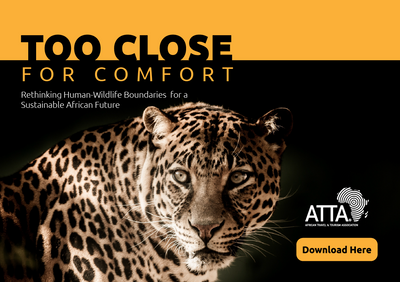As Africa’s wildlife tourism rebounds and grows, the line between an exciting encounter and a damaging intrusion is thinner than ever. This white paper explores how rising demand, social media, and outdated expectations are driving dangerous proximity across both land and sea. As the voice of African and Indian Ocean Islands tourism, ATTA® dug a little deeper with members, award winners, and partners to ground this analysis in evidence and day‑to‑day practice.
Drawing on case studies, expert voices, and the latest research, we outline why boundary‑setting is now the industry’s most urgent sustainability challenge, and provide practical, proven tools for operators and travel advisors who want to lead the way.
The future of authentic, ethical wildlife experiences depends on what we do next.
Key Points:
- PROXIMITY IS NOW WILDLIFE TOURISM’S GREATEST RISK AND OPPORTUNITY
The quest for closeness, fuelled by social media and guest expectations, can undermine both animal welfare and business sustainability. - GUIDES AND OPERATORS ARE UNDER PRESSURE FROM ALL SIDES
Power imbalances, tipping culture, and competitive marketing often force staff into impossible positions. - SMALL ACTIONS HAVE BIG IMPACTS
From vehicle caps to guest education and real-time data, practical, scalable tools exist, and leading operators are already making them work. - STORYTELLING AND RESPECT ARE THE NEW FRONT LINES
Shifting the guest experience from “spectacle” to “meaning” depends on skilled guides and a culture of ecological respect. - INDUSTRY CHANGE STARTS WITH DAILY CHOICES
Consistent boundaries, Transparent communication, and community co-governance are key to long-term viability.
DOWNLOAD WHITE PAPER

